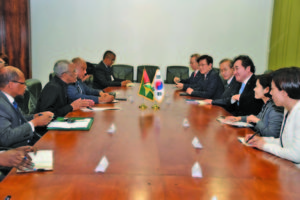President David Granger on Monday issued a call at the opening ceremony of the eighth World Water Forum (WWF) for the introduction of further initiatives to protect freshwater resources, particularly the rivers of the Guiana Shield, which, he said, has an important role to play in ensuring global water security.
The Head of State also outlined a three-point action plan aimed at enhancing a global commitment to continuous attention and unceasing action; to increased collaboration among States, especially neighbours which share the waters of rivers; and to improve conservation of water resources and the protection of the environment everywhere in order to maintain the integrity of the earth’s rivers and lakes.

Speaking at the opening ceremony of the Forum in Brasília, Brazil, President Granger said, “Guyana calls on this World Water Forum to take action to protect and preserve the Guiana Shield as a vital source of the world’s freshwater reserves. At stake is nothing less than humanity itself. Guyana, a small State, is part of the Guiana Shield, an area spread over 2.7 million square kilometres, making it bigger than Greenland. The Shield is a zone, which encompasses parts of Brazil, Colombia and all of French Guiana, Guyana, Suriname and parts of Venezuela. The Shield, described as the “lungs of the Earth” and the “greenhouse of the world” is a global resource because of the environmental services it provides.”
He added that the Guiana Shield was vital to global water security, because it contained 15 per cent of the world’s freshwater resources. The rivers of the Guiana Shield discharge an average of 2792 cubic kilometres of water annually, with one of the highest specific discharge rates for a zone of that size. However, water quality and environmental security are exacerbated owing to the adverse effects of climate change such as droughts, flooding, rising sea levels and other extreme weather events.
“The world’s freshwater supplies, unfortunately, are under threat. Water stress is increasing in many parts of the world. Aquifers are depleted faster than they are replenished. The growth of the world’s population will increase demand for water by 55 per cent by the year 2050, placing even further strain on freshwater reserves…. Rivers must be protected from pollution, including that caused by environmental degradation and the discharge of effluent from industry, mining, and agriculture. River pollution impacts adversely on water quality, on health, and the economic and social well-being of citizens,” President Granger is quoted by the Ministry of the Presidency as saying.
The Head of State also explained that protection of the sources of the world’s fresh water was essential to ensuring citizens’ entitlement to water, communities’ access to safe and sanitary water, and countries’ and the continent’s water security.



